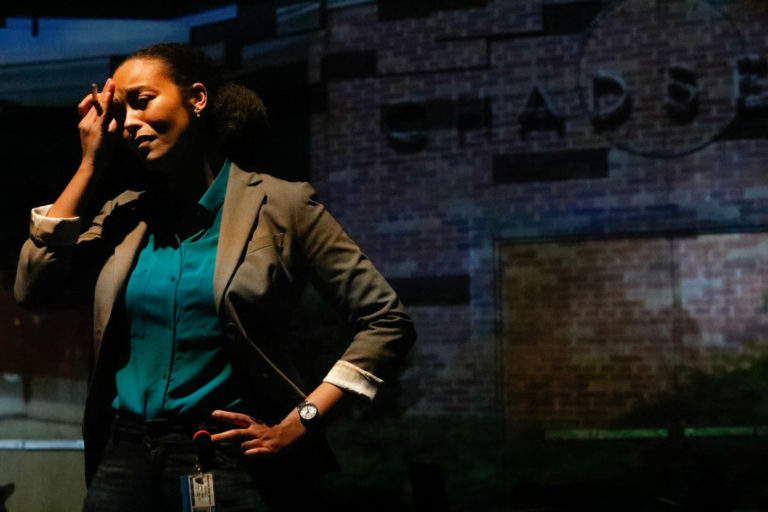
While it’s natural to wish that Westcoast Black Theatre Troupe had been able to present its production of Pipeline onstage before a full audience, in the usual way, it’s a tribute to playwright Dominique Morisseau, the actors and the director, L. Peter Callender, that to watch it on a screen, in WBTT’s parking lot with Covid protocols in place, does not detract from the immediacy and heart of what we are seeing.
It may have been challenging for the cast and crew to work around the demands for their own protection, but that strain doesn’t show in the video of their performances shot and edited by Bill Wagy. Rather, everyone seems laser focused on telling the all too believable story of a Black woman schoolteacher and her teenage son, whom she’s desperately trying to save from that “pipeline” leading directly from public school to prison.
To that end, although Nya herself (Renata Eastlick) works at an urban public high school, teaching Gwendolyn Brooks’ poetry, among other things, to her class, she and her ex-husband Xavier (Joel PE King), for whom she still cares, have enrolled their son Omari (Donovan Whitney) in a private academy. It may seem safer, and of a higher educational quality, but it’s not like Omari fits in. Things come to a head one particularly bad day when he feels harassed by a teacher there and pushes back—literally. The rules say he’s on strike three, and charges could be pressed. It all conspires to drive Nya almost to the breaking point.
Morisseau has kept her story and its relationships intensely personal, whether it’s that of Omari and Nya, Omari and his girlfriend Jasmine (Emerald Rose Sullivan, who’s both funny and sharp), or Nya and Xavier, battling to decide what’s best for their son. But it’s easy to imagine such a situation multiplied many times over in America today. Emilia Sargent, as a white teacher at Nya’s school, adds to the drama with her own attempts to both reach her students and survive trauma after she’s injured enough at work to require surgery. She eventually faces a crisis that involves a security guard at the school, Dun (Isaac Esau Gay), who has his own special relationship with Nya.
Throughout Pipeline, there is humor at work as well as fear, love and anger. The dialogue is all written with honesty by Morisseau, so that we can place ourselves inside the shoes of any character when he or she is speaking and understand where they’re coming from. The answers to the problems faced here are not going to be easy, and no promises are made, except to try.
Callender’s direction elicits the best from his cast, whether in moments of high tension or quieter ones. I was especially impressed by the work of Eastlick, Whitney, Sullivan and Sargent, but there is no weak link here, and the result is a production that will draw you in, make you care, and force yourself to ask some searching questions.
In-person screenings continue through this Thursday, after which Pipeline can be viewed via home streaming. Call (941) 366-1505 or go to westcoastblacktheatre.org. for tickets.